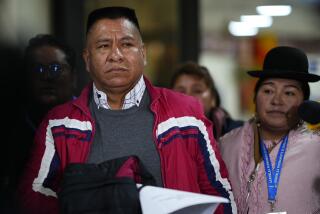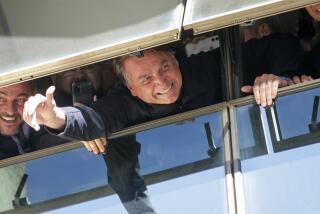Pope in Brazil on Mission to Aid Church, Poor : Religion: Hundreds of thousands greet the pontiff at the start of a 10-day visit.
- Share via
NATAL, Brazil — After 11 years, Pope John Paul II returned Saturday to the world’s biggest Roman Catholic country, and hundreds of thousands of Brazilians here welcomed him as Joao de Deus, “John of God.”
In an arrival speech, the Pope prayed that his visit would help strengthen the troubled Brazilian church and also contribute to “solidarity with the disadvantaged, those who need help the most, so that perverse economic inequalities, which bring intolerable individual and social discrimination, may disappear.”
The Pope will stop at 10 cities on his strenuous 10-day, 5,000-mile tour of Brazil, returning to Rome on Oct. 21. A major theme on his 53rd foreign trip--his fourth this year--is expected to be concern over a growing gap between rich and poor people around the world.
On his plane en route to Brazil, John Paul told reporters that the problem of social justice must be resolved. “It is a problem that more than ever concerns the church,” he said. “Once again, I will encourage the Brazilian bishops about this.” But John Paul also will stress--for the benefit of liberal Brazilian churchmen--that the church’s doctrinal message must shine clearly through its secular work on behalf of the poor, Vatican analysts say.
According to a church document issued early this year, 40% of Brazil’s workers earn less than $70 a month. Economic decline since 1980, when the Pope made his first trip to Brazil, has accentuated the plight of this country’s poor.
Natal is the capital of the state of Rio Grande do Norte in Brazil’s poorest region, the Northeast.
Brazil, the biggest country in Latin America, has a population of 150 million. About three-fourths of them call themselves Catholics, but less than a third of those attend Mass regularly, according to recent surveys.
Since the Pope’s last visit, millions of Brazilians baptized as Catholics have joined evangelical Protestant churches and other churches. On the way to Brazil, John Paul said the growth of those churches in Latin America was a “great challenge” to Catholicism. He said the growth of Protestant churches stems from a scarcity of priests.
Today, the Pope will close a Eucharistic conference that has gathered Brazilian bishops and Catholic faithful in Natal during the past week. This afternoon, he will fly to Sao Luis, capital of the northern state of Maranhao.
On Monday, he will make a protocol stop in Brasilia, the capital, meeting with President Fernando Collor del Mello. The Pope will meet with Brazilian Jewish leaders Tuesday in Brasilia.
Speaking to reporters before his arrival in Natal, he said the church would like to establish diplomatic relations with Israel, “but some problems must be resolved.” One problem that concerns the Vatican is Palestinian territorial claims and another is Christian and Muslim claims to spiritual rights in Jerusalem.
Referring to diplomatic relations with Israel, he told reporters: “As I once said to an American president, yes, we are always willing, but our interlocutors must make it a little easier for us.” He did not name the president.
The rest of the Pope’s Brazilian itinerary will take him to other state capitals: Goiania in central Goias, Cuiaba in western Mato Grosso, Campo Grande in Mato Grosso do Sul, Florianopolis in southern Santa Catarina, Vitoria in eastern Espiritu Santo, Maceio in northeastern Alagoas and Salvador in Bahia, also in the Northeast.
Of the cities on this trip, John Paul visited only Brasilia and Salvador in 1980.
He is returning to Salvador because it is the diocese of the Brazilian primate, Cardinal Lucas Moreira Neves.
Natal, a city of 600,000, was established by 17th-Century Portuguese settlers on the northeastern corner of South America where it juts into the Atlantic. In 1942, the United States built an air base here that served as a way-station for military flights to and from North Africa.
Natal means Christmas. Tourist brochures call it Sun City. Flanked by windswept dunes and beaches of tawny sand, it lies just south of the Equator.
Times staff writer William D. Montalbano, in Rome, contributed to this story.
More to Read
Sign up for Essential California
The most important California stories and recommendations in your inbox every morning.
You may occasionally receive promotional content from the Los Angeles Times.













